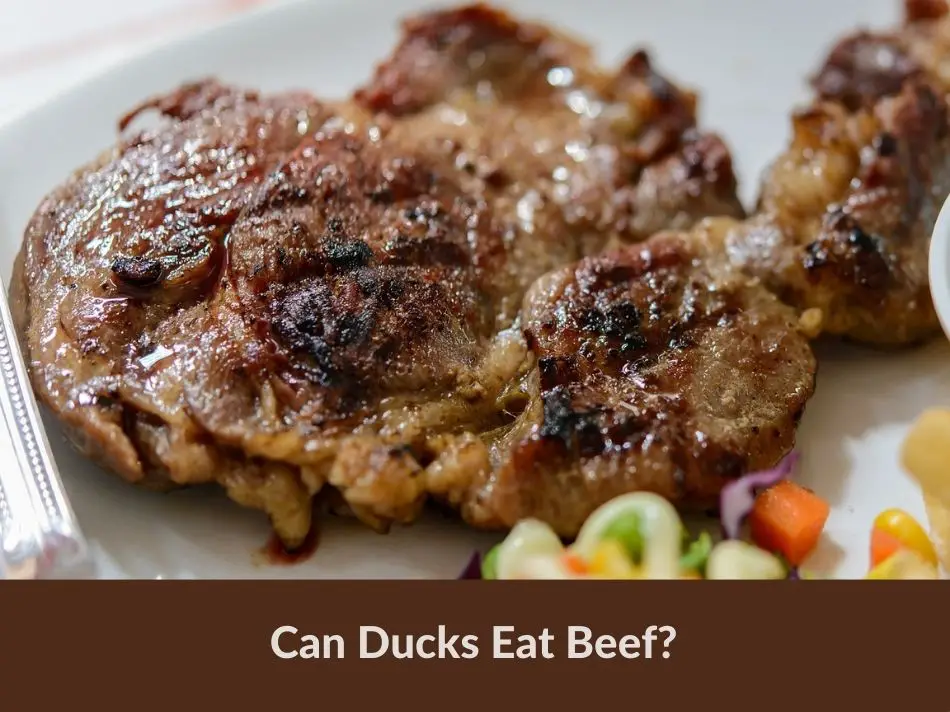Ducks are omnivorous birds and naturally consume a wide range of foods from grains and seeds to small invertebrates. Their diet can comprise of aquatic plants, algae, small fish, insects, and worms. But, can ducks eat beef?
Yes, ducks can eat beef. Raw or undercooked beef could harbor harmful bacteria that might be detrimental to a duck’s health. On the other hand, well-cooked beef, in small amounts, can be a source of protein.
In this article, we delve deep into the dietary habits of ducks, specifically concerning beef consumption. From understanding a duck’s natural diet to exploring the potential effects of feeding beef to both adult ducks and ducklings.
How Often Can I Feed My Ducks Beef?
If you’re considering offering beef to ducks, it should be given sparingly. Think of it as a rare treat rather than a regular food source. Perhaps once every couple of weeks, and only in small quantities.
The beef should always be cooked thoroughly to kill off any potential pathogens and should be free from any seasonings, spices, or sauces which can be harmful to ducks.
Can Ducklings Eat Beef?
Ducklings are much more sensitive than adult ducks, especially when it comes to their dietary needs. During the initial stages of their life, they primarily require a diet rich in protein. Typically, this protein comes from specially formulated duck starter feed or from small insects and worms.
While beef is a protein source, it’s not ideal for ducklings. Their digestive systems are not geared to process beef effectively, and there’s a risk of choking on larger pieces. So it’s best to stay clear of beef for ducklings.
Can Ducks Eat Beef Jerky?
No, ducks should not eat beef jerky. Beef jerky is typically high in salt and seasonings, which are not suitable for ducks and can be harmful in large amounts. The tough and dried nature of beef jerky can also be challenging for ducks to digest.
Is Beef Healthy For Ducks?
Beef, as many of us know, is a significant source of protein. When analyzing its potential nutritional contributions to a duck’s diet, several aspects come to the forefront.
- Protein Content: Beef’s primary nutritional component is its protein. Protein plays a critical role in muscle development and repair, feather growth, and overall body maintenance for ducks. Given their active nature, especially during migration seasons, ducks require adequate protein. While they typically source this from insects, small fish, and specific plants, beef could provide a supplemental boost.
- Fat Content: Beef, particularly certain cuts, contains a notable amount of fat. Fats are essential for ducks, aiding in energy storage, insulation, and buoyancy while swimming. The fats in beef are different from those in a duck’s natural diet, being more saturated. While it might offer some energy benefits in the short term, consistent feeding of beef might lead to excessive fat deposits, which could be detrimental to the duck’s health.
- Vitamins and Minerals: Beef is a source of various vitamins and minerals, including B vitamins (like B12), zinc, selenium, and iron. These nutrients are essential for various bodily functions, including metabolism, red blood cell production, and immune system support. Ducks would naturally source many of these nutrients from their varied diet, so beef could, in theory, contribute to fulfilling some of these needs.
- Absence of Carbohydrates: Ducks obtain much of their energy from carbohydrates found in grains, seeds, and aquatic plants. Beef, on the other hand, has negligible carbohydrate content. While the protein and fat in beef can offer energy, ducks might miss out on the immediate energy that carbs provide if beef becomes a significant part of their diet.
- Potential Risks: Beyond its nutritional content, it’s crucial to acknowledge the risks associated with feeding beef to ducks. The potential for bacterial contamination, especially in raw or undercooked beef, poses a health risk. Additionally, processed beef products or those seasoned with salt, spices, and other additives, can introduce unwanted chemicals into a duck’s system, which could lead to health issues.
How To Feed Beef To Ducks
- Choose the Right Beef: Opt for lean cuts of beef, avoiding fatty portions. This helps in providing protein without excessive fat.
- Cook Thoroughly: Always offer ducks fully cooked beef. This reduces the risk of transmitting harmful bacteria or parasites that might be present in raw meat. Avoid using any seasonings, salts, spices, or sauces during cooking.
- Cut into Small Pieces: Before offering it to ducks, cut the beef into tiny, bite-sized pieces. This makes it easier for them to consume and reduces the choking hazard.
- Limit Quantity: Offer beef in moderation. A small handful of beef pieces is sufficient for a group of ducks. Remember, it should be an occasional treat, not a regular diet item.
- Avoid Processed Beef Products: Refrain from giving ducks beef products like sausages, beef jerky, or burgers, as these often contain added ingredients and preservatives that can be harmful to them.
- Always Provide Fresh Water: Ducks need to drink water while they eat, helping them digest food properly. Keep a fresh water source nearby whenever you’re feeding them. They’ll likely take a sip after each bite.
Other Berries Ducks Can Eat
Ducks, in their versatile dietary nature, can consume a variety of human foods in moderation, aside from their natural diet. While it’s always best to stick to foods ducks would naturally find in their habitats, certain human foods can be safe and occasionally nutritious treats for them.
Below are some more human foods that ducks can eat:
Be sure to explore our list of human food suitable for ducks.
Conclusion
Ducks, with their omnivorous diet, have the capacity to eat a variety of foods, beef included. Yet, what’s possible isn’t always what’s best. While a small, occasional treat of cooked beef might not harm an adult duck, it shouldn’t become a routine.
Disclaimer: The information in this article is for informational purposes only. I'm not an expert or a veterinarian.


